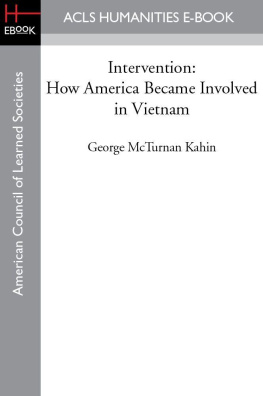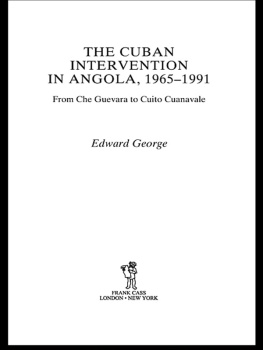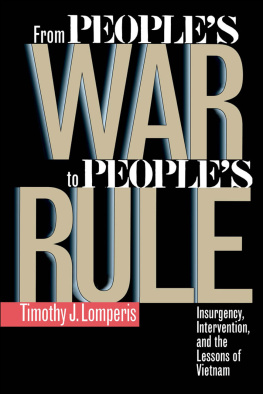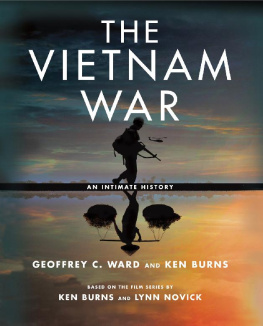George McTurnan Kahin - Intervention: How America Became Involved in Vietnam
Here you can read online George McTurnan Kahin - Intervention: How America Became Involved in Vietnam full text of the book (entire story) in english for free. Download pdf and epub, get meaning, cover and reviews about this ebook. year: 2013, publisher: ACLS Humanities E-Book, genre: Politics. Description of the work, (preface) as well as reviews are available. Best literature library LitArk.com created for fans of good reading and offers a wide selection of genres:
Romance novel
Science fiction
Adventure
Detective
Science
History
Home and family
Prose
Art
Politics
Computer
Non-fiction
Religion
Business
Children
Humor
Choose a favorite category and find really read worthwhile books. Enjoy immersion in the world of imagination, feel the emotions of the characters or learn something new for yourself, make an fascinating discovery.
- Book:Intervention: How America Became Involved in Vietnam
- Author:
- Publisher:ACLS Humanities E-Book
- Genre:
- Year:2013
- Rating:5 / 5
- Favourites:Add to favourites
- Your mark:
- 100
- 1
- 2
- 3
- 4
- 5
Intervention: How America Became Involved in Vietnam: summary, description and annotation
We offer to read an annotation, description, summary or preface (depends on what the author of the book "Intervention: How America Became Involved in Vietnam" wrote himself). If you haven't found the necessary information about the book — write in the comments, we will try to find it.
Intervention: How America Became Involved in Vietnam — read online for free the complete book (whole text) full work
Below is the text of the book, divided by pages. System saving the place of the last page read, allows you to conveniently read the book "Intervention: How America Became Involved in Vietnam" online for free, without having to search again every time where you left off. Put a bookmark, and you can go to the page where you finished reading at any time.
Font size:
Interval:
Bookmark:

THIS IS A BORZOI BOOK
PUBLISHED BY ALFRED A. KNOPF, INC.
Copyright 1979, 1986 by George McT. Kahin
All rights reserved under International and Pan-American Copyright Conventions. Published in the United States by Alfred A. Knopf, Inc., New York, and simultaneously in Canada by Random House of Canada Limited, Toronto. Distributed by Random House, Inc., New York.
A portion of this work was originally published in Pacific Affairs, Winter 1979-1980.
Library of Congress Cataloging-in-Publication Data
Kahin, George McTurnan.
Intervention: how America became involved in Vietnam.
1. Vietnamese Conflict, 1961-1975-United States.
2. Vietnam-Politics and government-1945-1975.
3. United States-Foreign relations-Vietnam.
4. Vietnam-Foreign relations-United States.
I. Title.
DS558.K34 1986 959-7043373 85-45703
ISBN 0-394-54367-X
Manufactured in the United States of America
FIRST EDITION
ACLS Humanities E-Book handheld edition 2013
ISBN: 978-1-59740-991-9
HEB02216.0001.001
For Audrey

Maps will be found on pages

[Page ix]
In an unprecedented effort to shape and control a countrys political character, the power of the United States was for some thirty years projected into Vietnam -at first indirectly through France, and then directly. Beginning a few months after the Second World War, this effort lasted until 1975; but its crucial formative period ended in mid-1966, by which time American policy was locked on course and the society of Vietnams southern half had become fully polarized. With its focus on these first two decades, this book seeks to make understandable why and how the United States intervened in Vietnam.
Although military aspects of this involvement have been dealt with extensively, the political side has received relatively little attention, and it is with this dimension and its relationship to other aspects of American involvement that this book is principally concerned. Therefore, one of my major emphases is on the way in which changing Vietnamese political factors both within and outside Saigoncontrolled areas-impinged on and crucially affected both the military and the political aspects of American policy and its execution. I also focus on the reverse of that process, for both the changing character and magnitude of the American intervention and the shifting character of political forces in South Vietnam produced an ongoing interdependence and interaction an often unpredictable dynamic-to which U.S. policymakers were obliged to react, albeit sometimes with disparate counsel and discordant actions.
The American effort to influence the political character of Vietnam began during Frances postwar attempt to reassert control over the country, but that effort became more intense after French forces withdrew, when Washington wished to prevent the extension of communist control over additional Vietnamese territory. The building of a separate anticommunist state in southern Vietnam demanded a continuing American effort aimed at shaping the Saigon government into an instrument supportive both of U.S. strategic and geopolitical objectives and of the military policies required to attain them. This book analyzes that process, and the internal Vietnamese factors that confronted the United States and affected American policies. These factors were subject to frequent change, in large part because American efforts to control the course of Vietnamese politics, together with the physical and psychological impact of U.S. firepower, precipi tated strong nationalist reactions and created new or altered political forces. An understanding of the context of American involvement requires a fuller treatment of the militant Buddhists, the National Liberation Front, and factional divisions and competition within Saigons armed forces than has, I believe, been available in earlier studies, and this I have sought to provide.
Against this background, it should be easier to understand and evaluate the course of Vietnams political and socioeconomic life, as well as the often divergent assessments of American policymakers and the decisions they urged. And against it, too, one should be better able to judge how well American presidents were served by their advisers. The book also concerns itself with relevant aspects of domestic American politics and the global strategic and political perspectives that heavily influenced Washington policymakers.
I have drawn on and tried to weave together three principal strands of information: the views of Vietnamese civilian and military leaders gained in interviews during half-a-dozen visits to Vietnam from 1961 to 1972; information from American officials, from several levels, who were concerned with Vietnam, as well as from a number of knowledgeable British and French officials; and some 12,000 pages of U.S. government documents declassified under the Freedom of Information Act that I was able to obtain over a ten-year period. This material substantially augments that available in the three editions of the Pentagon Papers, of which I have also made good use.
My first relevant interviews were with John Foster Dulles in 1950 and Ngo Dinh Diem in 1953; the most recent, with George Ball, McGeorge Bundy, and William Bundy in 1984-85. In addition, other government officials, active and retired, have been generous in the time they have given me. Among them, I would particularly like to thank Averell Harriman, Paul Kattenburg, James Thomson, Jr., and the late John Paul Vann, as well as Etienne Manach, formerly head of the Quai dOrsays Far Eastern Division, and the late Anthony Eden (Lord Avon). To William Bundy I wish also to record my gratitude for letting me read his unpublished but extensive and richly informative study of American policy toward Vietnam during 1961-65. The disinclination of Robert McNamara to be interviewed on matters pertaining to the Vietnam war explains his absence from this roster, while a similar disposition on the part of Dean Rusk accounts for the fact that I record only one discussion with him, which took place in 1965.
I have also benefited from talks with numerous active and retired civilian and military leaders of the Saigon government, and I wish to express my gratitude to them for the time they spent in helping me understand its often convoluted civilian and military politics. This book also reflects, I believe, the unusual access I had to the leadership of both the Buddhists and the NLF; and I should like to record my debt especially to three of the Buddhist leaders with whom I spent many hours of enlightening conversation-Thich Nhat Hanh, Thich Tri Quang, and the late Thich Thien Minh-as well as to two NLF leaders whom I met and who during different periods each served as that organizations secretary-general [Page xi] Nguyen Van Hieu and Tran Buu Kiem-for the open and informative discussions I had with them.
I have made considerable, and I believe discriminating, use of the uneven coverage provided by the three editions of the Pentagon Papers, including the rare separate volume of footnotes keyed to the Government Printing Office edition (and now deposited in Cornell Universitys library) which is useful in determining the quality of certain narrative sections of the Papers. Most of the U.S. government documents which I have utilized, however, were obtained under the Freedom of Information Act. I am fortunate that I initiated my requests for them in 1974, the beginning of a brief period when, on balance, that act was interpreted in ways that usually helped rather than hindered scholarly research. Although many important documents which I have specifically requested have not been released, a large amount of material-describing important aspects of American activities in Vietnam and areas of U.S. policymaking not covered in the Pentagon Papers-has been declassified and made available to me. The time consumed and frequent frustration involved in the effort to secure declassification should be evident when I note that it has averaged almost two years per document, with some taking as long as six. Under the Reagan administration, such declassification requests have usually fared much worse than under the Ford and Carter administrations; and recently one key document bearing on the removal of Diem, which President Johnson himself declassified in 1968, has been reclassified. Nevertheless, it should be emphasized that the relevant documents which have become available since the appearance of the Pentagon Papers illuminate numerous crucially important matters not covered there. These recently released materials are also helpful in compensating for some inaccurate or superficial coverage in the Papers. (Unless otherwise noted, declassified documents referred to in this study can now be found in the library of the president in office on the date of the document in question.) Having earned the dubious reputation of being the initiator of the largest number of specific requests for declassification of U.S. documents relating to Vietnam, I want to thank the many Foreign Service officers and other officials saddled with the dismal task of responding to these requests and to subsequent appeals for review of initially negative decisions.
Next pageFont size:
Interval:
Bookmark:
Similar books «Intervention: How America Became Involved in Vietnam»
Look at similar books to Intervention: How America Became Involved in Vietnam. We have selected literature similar in name and meaning in the hope of providing readers with more options to find new, interesting, not yet read works.
Discussion, reviews of the book Intervention: How America Became Involved in Vietnam and just readers' own opinions. Leave your comments, write what you think about the work, its meaning or the main characters. Specify what exactly you liked and what you didn't like, and why you think so.






